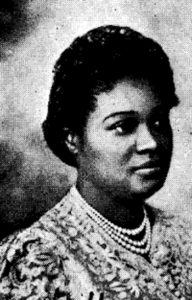
Wilhemina Crosson
*Wilhelmina Crosson was born on this date in 1900. She was a Black educator and school administrator known for her innovative teaching methods.
Wilhelmina Marguerita Crosson was born in Rutherford, New Jersey, to Charles Tasker Crosson and Sallie Alice Davis Crosson. She was the fourth of nine children. 1906, Crosson moved with her family to Boston and attended the Hyde School and Girls' High School in Roxbury. She earned a B.S. degree in education at Boston Teachers College in 1934 and a master's degree in educational administration from Boston University in 1954.
Crosson began her teaching career in 1920 at the Hyde School in Boston's North End, teaching remedial reading to the children of Italian immigrants. She was one of the first American teachers to recognize the need for remedial reading classes, and she developed Boston's first remedial reading program in 1935. Crosson's pioneering methods were so successful that administrators and other teachers were regularly sent to observe her classes, and she lectured on the subject. She was a close friend of Charlotte Hawkins Brown.
In 1925, she founded the Aristo Club of Boston, an organization of black professional women who studied and taught black history and awarded scholarships to black children. The Boston school system began observing Negro History Week because of the Aristo Club's efforts. In 1933, Crosson published an article in the Elementary English Review titled "The Negro in Children's Literature." It was the first article in a mainstream American teaching journal asking teachers to celebrate African American culture and the first article by a self-described "Negro" author to appear in the journal.
In the article, Crosson recommended the teaching of "Negro literature" (which she defines as works by, for, and about black people), reasoning that black children should not be deprived of the literature of their race and that all children would benefit from the experience: Surely, it is important for the American schoolchild to know something about the literature of this black race which came to America a little over three hundred years ago and has become an important and integral part of this nation. She also recommended the teaching of African Americans such as Harriet Tubman alongside those of whites, proposing that this would "...make the Negro child strive to lift his race to higher levels, and the white child feel that the Negro race has played its part in the making of America."
In 1945 she took a sabbatical to study intercultural education in Mexico's public schools for the Association for the Study of Negro Life and History. Upon her return, she continued at Hyde School, where she made many changes in the curriculum and inspired a love of reading in her students. She also volunteered as a Sunday school teacher at the Twelfth Baptist Church and taught black history lessons on Saturdays. Crosson became president of the Palmer Memorial Institute in Sedalia, North Carolina, in 1952. She established many new programs at the school and obtained funding from the government and the Ford Foundation.
Crosson retired in 1966. In 1968, she worked with North Carolina College developing a training program for Peace Corps volunteers on assignment in Liberia. In 1970, she returned to Boston, where she volunteered in homeless shelters and as a tutor. Wilhelmina Crosson died on May 28, 1991, at her home in the South End of Boston, at the age of 91.
To Become a School Principal
To Become an Elementary School Teacher